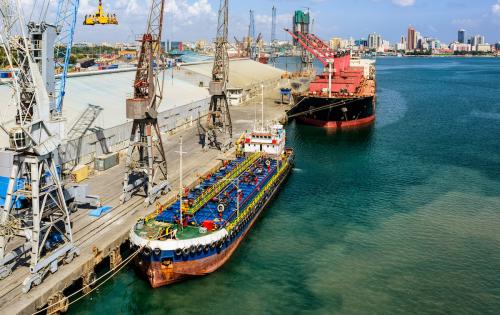This viewpoint is part of Foresight Africa 2024.
By working together, advancing integration, and operating with one voice, Africa can drive the re-globalization conversation and put itself in a position to reap its benefits.
The idea of globalization brought with it the idea of prosperity. Yet ever since globalization has been discussed questions have been raised around its effectiveness and ability to bring prosperity to all. In recent years this has been especially true considering global challenges like the COVID-19 pandemic, conflict in Ukraine, and supply chain difficulties that arose from them. In Africa, we know that despite its promise many Africans have not seen globalization’s benefits and many African countries have struggled to move up along global value chains. In fact, as recently as 2022, 46 African economies were considered dependent on the export of primary commodities, a situation associated with lower levels of development, economic instability, and fiscal unpredictability.1
But this does not mean that a globally connected world is misplaced, it means that the operational structure that underpins globalization must change in a way that spreads the benefits of trade to all. It is in this space that Africa has a unique place to drive the conversation around re-globalization and position itself at the center of a new effort to own its trajectory.
Africa’s commitment to a resilient and sustainable future that works for all Africans is strong. Despite challenges, the continent is making significant progress in advancing initiatives like the African Continental Free Trade Area (AfCFTA). The AfCFTA promises to unite more than 50 individual economies and nearly 1.5 billion people in a manner that is resilient, inclusive, and sustainable.2 This modality, Africa working with Africa, gives it a blueprint for success. Helping to illustrate its promise, modeling estimates from the United Nations Economic Commission for Africa show that in 2045, as compared to the situation without the AfCFTA, the value of intra-African trade can rise by 33.5% with the full implementation of the Agreement with the largest gains going to sectors that Africa needs to build resilience in most like Agrifood, Services, and Industry.3 Here, the AfCFTA will also help Africa move up along regional and global value chains. As of 2019, Africa’s participation in global value chains was a mere 1.7%.4 Yet, the AfCFTA can help drive inward investment flows to build the infrastructure, capacity, and expertise needed to move up along regional and global value chains that sometimes stand in conflict with one another. It will do so through creating a harmonized landscape for investment, competition, and intellectual property rights via dedicated and standalone protocols to the Agreement.
Yet, in another context, re-globalization will bring Africa into central focus due to its unique endowment of green transition minerals like cobalt, lithium, and nickel. Green minerals can help Africa pursue its environmental and development objectives simultaneously, but to do so it cannot harvest its resource endowment in the same manner of the past. Africa must make needed investments in infrastructure, technical expertise, and private enterprise that will help it industrialize in a sustainable and resilient way and permit it to specialize in the export of higher value-added production and raise its voice on the global stage.
To seize upon the promise of re-globalization we must also recognize that challenges exist. Africa simply cannot compete against major trading powers that use tax and subsidy policy to draw investment. But by working together, advancing integration, and operating with one voice, Africa can drive the re-globalization conversation and put itself in a position to reap its benefits.
-
Footnotes
- Analysis defines primary commodities as “primary commodities, precious Stones and non-monetary gold (SITC 0+1+2+3+4+68+667+971)” from UNCTADstat. 2022. Merchandise trade matrix in thousands United States dollars, annual database.
- United Nations. 2023. Economic Commission for Africa (ECA). “AfCFTA what you need to know: frequently asked questions & answers.” https://repository.uneca.org/handle/10855/49411.
- ECA (forthcoming).
- OECD. 2022. “Regional value chains in Africa for better global integration.”
The Brookings Institution is committed to quality, independence, and impact.
We are supported by a diverse array of funders. In line with our values and policies, each Brookings publication represents the sole views of its author(s).









Commentary
Re-globalization and Africa’s integral role in a sustainable future
July 30, 2024